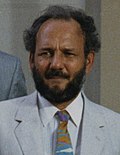| |||||||||||||||||||||||||||||||
15 of 23 seats in the House of Assembly 8 seats needed for a majority | |||||||||||||||||||||||||||||||
|---|---|---|---|---|---|---|---|---|---|---|---|---|---|---|---|---|---|---|---|---|---|---|---|---|---|---|---|---|---|---|---|
| Turnout | 72.38% ( | ||||||||||||||||||||||||||||||
| |||||||||||||||||||||||||||||||
 Results by constituency | |||||||||||||||||||||||||||||||
| |||||||||||||||||||||||||||||||
General elections were held in Saint Vincent and the Grenadines on 16 May 1989. [1] The result was a landslide victory for the centrist New Democratic Party, which won all fifteen seats, returning James Mitchell to a second term as prime minister. Voter turnout was 72%. [2]
The 1989 election was the most lopsided in terms of the popular vote margin since the country gained independence in 1979, with the NDP securing a 36-point victory over the second-placed Saint Vincent Labour Party.
